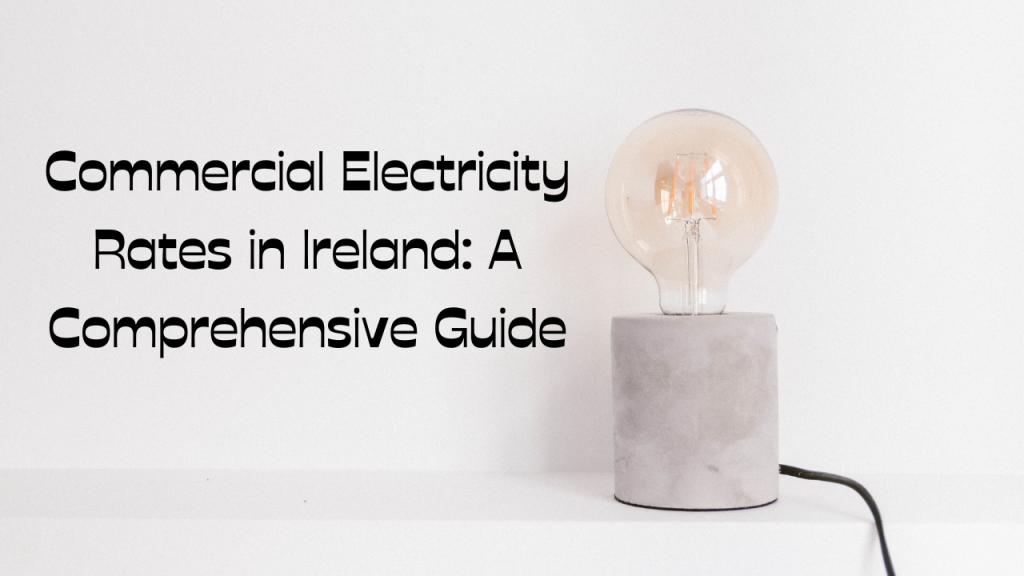
Commercial Electricity Rates in Ireland: A Comprehensive Guide
Introduction
Relevance for businesses in Ireland
Electricity is an essential input for most businesses in Ireland. The cost of electricity can have a significant impact on a business’s bottom line, so it is important for businesses to understand commercial electricity rates and how to choose the best plan for their needs.
Did you know that the average Irish business pays over €10,000 per year on electricity? That’s a lot of money, and it’s something that businesses of all sizes should be paying attention to. Monthly Wholesale Electricity price explains average wholesale electricity price in Ireland.
Understanding Commercial Electricity Rates
What Are Commercial Electricity Rates?
Commercial electricity rates are the prices that businesses pay for electricity. They differ from residential rates in a few key ways. First, commercial rates are typically higher than residential rates. This is because businesses tend to use more electricity and require more reliable service. Second, commercial rates are often more complex than residential rates. This is because they may include a variety of different charges, such as demand charges and capacity charges. Checkout this blog To find cheapest electricity in Ireland.

Factors Influencing Commercial Electricity Rates
There are a number of factors that can influence commercial electricity rates, including:
- The type of business: Some businesses, such as manufacturing and retail, use more electricity than others. This means that they may pay higher rates.
- The size of the business: Larger businesses typically pay lower rates per unit of electricity than smaller businesses. This is because they can negotiate better deals with electricity suppliers.
- The location of the business: Electricity rates can vary depending on the region. This is because the cost of generating and delivering electricity can vary from region to region.
- The time of day: Electricity rates are often higher during peak demand hours. This is because electricity suppliers need to generate more electricity to meet demand during these times.
Types of Commercial Electricity Plans
There are a number of different types of commercial electricity plans available in Ireland. The most common types of plans are:
- Fixed-rate plans: With a fixed-rate plan, you pay a fixed price per unit of electricity for the duration of your contract. This type of plan can be a good option for businesses that want to avoid surprises on their electricity bills.
- Variable-rate plans: With a variable-rate plan, the price per unit of electricity can fluctuate depending on market conditions. This type of plan can be more risky than a fixed-rate plan, but it can also be cheaper if the price of electricity goes down.
- Time-of-use (TOU) plans: With a TOU plan, you pay different prices per unit of electricity depending on the time of day. This type of plan can be a good option for businesses that can reduce their electricity consumption during peak demand hours.
- Renewable energy plans: Renewable energy plans offer electricity that is generated from renewable sources, such as wind and solar power. This type of plan can be a good option for businesses that want to reduce their carbon footprint.
How to Find and Compare Commercial Electricity Rates
Researching Electricity Providers
There are a number of different electricity providers in Ireland. To find the best provider for your needs, you should start by researching the different options available. You can compare rates and plans online, or you can contact electricity providers directly to get quotes. Also learn Business Energy Efficiency Tips to reduce energy cost.
Comparing Plans and Rates
When comparing commercial electricity plans, it is important to consider all of the following factors:
- The price per unit of electricity: This is the most important factor for most businesses.
- The type of plan: Consider whether you want a fixed-rate plan, variable-rate plan, TOU plan, or renewable energy plan.
- The contract term: Electricity contracts typically last for one to two years. Make sure to choose a contract term that is right for your business.
- Any additional fees: Some electricity providers charge additional fees, such as connection fees and termination fees. Be sure to ask about these fees before you sign a contract.
Conclusion:
In conclusion, armed with a deep understanding of commercial electricity rates in Ireland and the strategies outlined in this comprehensive guide, your business has the tools to navigate the intricate market, reduce energy costs, and embrace a more sustainable future. By hiring a broker like Business Utility broker you can make informed decisions about rate types, suppliers, and energy-efficient practices, you can position your business for success in a rapidly evolving energy landscape. As you move forward, keep a keen eye on emerging trends and opportunities, ensuring that your business not only thrives financially but also contributes to Ireland’s broader goals of energy efficiency and environmental responsibility.
